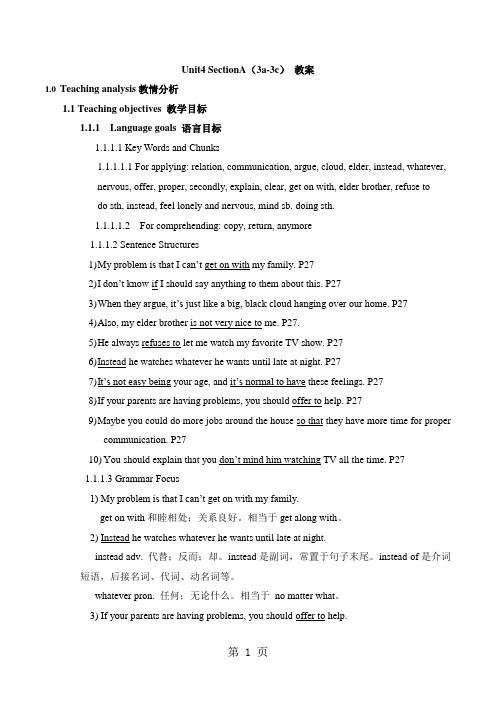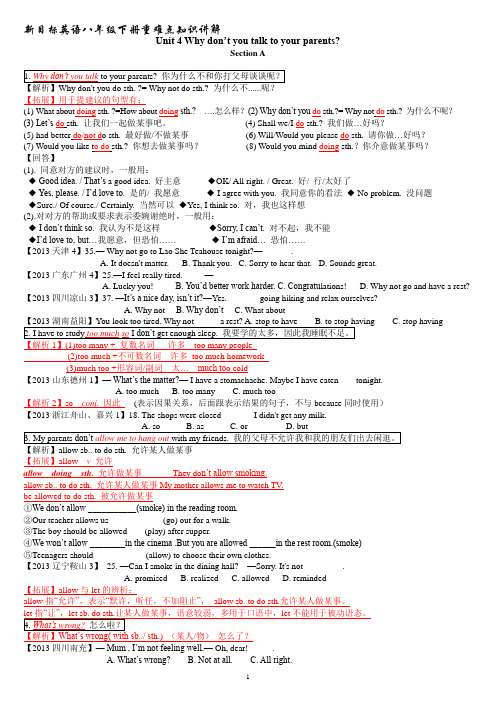八下教学设计unit4-why-don't-you-talk-to-your-parents
八年级英语下册教案:Unit4 Why don't you talk to your parents

Unit 4备课说明一、单元内容:Why don't you talk to your parents?二、教学目标:【知识目标】学会用why don't you…提建议【能力目标】1.能够运用所学知识谈论问题和困难、提出建议并做出选择;2. 能根据对方所提出的问题,给出一些合理的建议。
【情感目标】培养学生良好的合作意识,鼓励学生大胆表达自己的想法和意愿。
正确认识生活中的一些困难,能采用正确的方式解决生活中的问题。
三.教学重点:单词短语: allow wrong midnight guess deal …What's wrong look through big deal work outtoo many too much get into a fight…句子:What's wrong ? I have to study too much…I have too many …Why don't you go to sleep…语法:W hy don't you…提建议四、教学难点:学习掌握单词,词汇,短语并灵活运用.学会谈论问题和给出建议。
五、教具准备:PPT六、课时安排:Section A 1 (1a -2d)....................................................................................1课时Section A 2 (3a-3c) ...................................................................................1课时Section A 3 (Grammar Focus-4c)............................................................... 1课时Section B 1 (1a-1e)......................................................................................1课时Section B 2 (2a-2e).................................................................................... 1课时Section B 2 (3a-self check)........................................................................ 1课时共计6课时Section A 2 (3a-3c)Step 1 RevisionSome Ss give some problems. Other Ss give advice. Problems and advice: 1. I have to study too much so I don't get enough sleep.Why don't you go to sleep earlier this evening?2. I have too much homework so I don't have any free time to do things I like.Why don't you go camping with your friends this weekend?3. My parents don't allow me to hang out with my friends.Why not read some interesting b ooks at home?4. I have too many after-school classes.Why don't you talk about it with your parents?5. I got into a fight with my best friend.Why not call him up?Role-play the conversation of 2d.Step 2 Presentation the new words1.relation n.关系;联系2. argue v. 争吵;争论3. proper adj.正确的;恰当的4. nervous adj. 焦虑的;担忧的5. clear adj.清楚易懂的;晴朗的Step 3 Lead in通过问答一些有关家庭生活的问题来导入正题:1. Can you get on well with your family?2. Are the relations between your parents good?3. Do you have any brothers or sisters? Can you get on well with him/her?4. Who do you ask for help when you have problems?Step 4 ReadingWork on 3a:1. Tell Ss to read the article in 3a quickly and try to find the answers to these questions:What's Sad and Thirteen's problem?How does he feel at home?2. Ss read the article again and fill in the chart.Work on 3b: 让学生们讨论罗波特先生对问题的建议,并发表自己的看法。
人教版英语八年级下册教案:Unit4 Why don’t you talk to your parents? SectionA(3a-3c)

Unit4 SectionA(3a-3c)教案1.0Teaching analysis教情分析1.1Teaching objectives 教学目标1.1.1Language goals 语言目标1.1.1.1 Key Words and Chunks1.1.1.1.1 For applying: relation, communication, argue, cloud, elder, instead, whatever,nervous, offer, proper, secondly, explain, clear, get on with, elder brother, refuse todo sth, instead, feel lonely and nervous, mind sb. doing sth.1.1.1.1.2 For comprehending: copy, return, anymore1.1.1.2 Sentence Structures1)M y problem is that I can’t get on with my family. P272)I don’t know if I should say anything to them about this. P273)W hen they argue, it’s just like a big, black cloud hanging over our home. P274)A lso, my elder brother is not very nice to me. P27.5)H e always refuses to let me watch my favorite TV show. P276)I nstead he watches whatever he wants until late at night. P277)I t’s not easy being your age, and it’s normal to have these feelings. P278)I f your parents are having problems, you should offer to help. P279)M aybe you could do more jobs around the house so that they have more time for propercommunication. P2710)You should explain that you don’t mind him watching TV all the time. P271.1.1.3 Grammar Focus1) My problem is that I can’t get on with my family.get on with和睦相处;关系良好。
人教新目标2014春八年级下册unit4-Why-don't-you-talk-to-your-parents课文重难点讲解(打印)

新目标英语八年级下册重难点知识讲解Unit 4 Why don’t you talk to your parents?Section A【拓展】用于提建议的句型有:(1) What about doing sth. ?=How about doing sth.? ….怎么样?(2) Why don’t you do sth.?= Why not do sth.? 为什么不呢?(3) Let’s do sth. 让我们一起做某事吧。
(4) Shall we/I do sth.? 我们做…好吗?(5) had better do/not d o sth. 最好做/不做某事(6) Will/Would you please do sth. 请你做…好吗?(7) Would you like t o do sth.? 你想去做某事吗?(8) Would you mind doing sth.?你介意做某事吗?【回答】(1). 同意对方的建议时,一般用:◆ Good idea. / That’s a good idea. 好主意◆OK/ All right. / Great. 好/ 行/太好了◆ Yes, please. / I’d love to. 是的/ 我愿意◆ I agree with you. 我同意你的看法◆ No problem. 没问题◆Sure./ Of course./ Certainly. 当然可以◆Yes, I think so. 对,我也这样想(2).对对方的帮助或要求表示委婉谢绝时,一般用:◆ I don’t think so. 我认为不是这样◆Sorry, I can’t. 对不起,我不能◆I’d love to, but…我愿意,但恐怕……◆ I’m afraid… 恐怕……【2013天津4】35.— Why not go to Lao She Teahouse tonight?— ______.A. It doesn't matter.B. Thank you.C. Sorry to hear that.D. Sounds great.【2013广东广州4】25.—I feel really tired. —______A. Lucky you!B. You’d better work harder.C. Congratu lations!D. Why not go and have a rest? 【2013四川凉山3】37. —It’s a nice day, isn’t it?—Yes. ______ going hiking and relax ourselves?A. Why notB. Why don’tC. What aboutC. stop having【解析1】(1)too many + 复数名词许多too many people(2)too much +不可数名词许多too much homework(3)much too +形容词/副词太… much to o cold【2013山东德州1】—What’s the matter?— I have a stomachache. Maybe I have eaten ___ tonight.A. too muchB. too manyC. much too【解析2】so conj. 因此(表示因果关系,后面跟表示结果的句子,不与because同时使用)【2013浙江舟山、嘉兴1】18. The shops were closed_______ I didn't get any milk.【拓展】allow v 允许allow doing sth.允许做某事They do n’t allow smoking.allow sb.. to do sth. 允许某人做某事My mother allows me to watch TV.be allowed to do sth. 被允许做某事①We don’t allow ___________(smoke) in the reading room.②Our teacher allows us ____________(go) out for a walk.③The boy should be allowed____(play) after supper.④We won’t allow ________in the cinema .But you are allowed ______in the rest room.(smoke)⑤Teenagers should ___________ (allow) to choose their own clothes.【2013辽宁鞍山3】25. —Can I smoke in the dining hall? —Sorry. It's not_________.A. promisedB. realizedC. allowedD. reminded【拓展】allow与let的辨析:allow指“允许”,表示“默许,听任,不加阻止”,allow sb. to do sth.允许某人做某事。
教学设计 Unit 4 Why don’t you talk to your parents

Unit 4 Why don’t you talk to your parents? 教学设计(Section A 1a-2c)学校:湖北省武汉市新洲区汪集初级中学年级:八年级教师:胡慧一、教学内容分析:本课选自人教新目标《Go for it》八年级下册Unit 4 Why don’t you talk to your parents? (Section A 1a-2c)。
本课属于本单元的第一节课(听说课),采用翻转课堂的模式,课前让学生先独自观看微课(problems and advice),了解课堂内容,初步复习和自学could/should,why not/ why don’t you…等表建议的表达方式。
学生在自学完微课后,通过完成课前任务清单上面的内容,对重难点进行及时复习巩固,小组合作记忆单词和短语,纠正发音,共同进步,互相帮助掌握重点词组和句型,能用英语陈述自己的困难和麻烦的同时,也学会用正确的英语句型给出建议。
课堂上,通过游戏活动等方式,对学生自学情况进行检测和引导,话题大多是贴近学生学习生活的内容,很容易让学生产生共鸣,激发学习兴趣,让学生动脑筋解决困难和麻烦的同时,给学生渗透“正确看待困难,勇于面对挫折,学会解决问题,快乐面对生活”的生活态度。
二、学情分析:本节课内容中对寻求帮助“what should I do?”的句型,在本册第一单元就已经学习过了,对于should和could的句型,学生之前已经接触过,大部分学生接受较快,所以这两块的内容以复习为主;对于why not和why don’t you句型学生表现的较为生疏,所以课堂上的pair work活动,以训练这组句型为主,课堂上也尽量多用这组句型,加强学生对why not和why don’t you句型的听说练习。
本节课以听说课为主,大部分都是让学生进行听说练习,最后一个环节增加了一个小组讨论活动,让学生尝试着把课堂上说的句型写下来,因为本册第一单元已经学过部分表建议的句型,所以这个环节对学生而言是一个拓展,但困难不大。
2023-2024人教版英语八年级下册大单元整体教学设计【新课标】Unit 4 Why don't

能理解和掌握含有连词until,athough.so that的相关表达个人困扰的句子。
Period 3
Section A
2d + F-4c)
1.学生通过学习词汇详解,学习本课时新单词和短语。
3.能够学会在语境中感悟或体会词汇含义,找出意思相近或相同的语言表达。
课时教学目标
Period 1
Section A 1a-2c
能初步使用“should ”“why don’t you...?”谈论表达个人建议。
能简单地谈论青少年在人际交往中遇到的困扰,并能说出自己的观点。
Period 2
Section A 3a-3c
1.归纳、梳理了本单元的重要句式结构和语法。
2.强化和巩固本单元目标语言。
1.选词填空。对连词表意功能的理解和运用。
2.写出完整的表达建议的句子。
3.开放性较强的口语交际活动,训练学生对所学语言内容的实际运用能力。
Period 4
听说
课
1a-1b融入新的词汇,让学生能够使用更丰富的语言表达来描述遇到的压力,讲述他们舒缓压力的方式,1c-1d进一步巩固单元所学的语法知识,强化连词的运用意识;1d体现了词块学习的特点;1e是一个全开放式口语实战演练,学生就三个小话题展开讨论,给出舒缓压力的建议。
思维
品质
通过听说读看写等训练,能够准确表达人际关系中的问题与建议。使学生能够正视自己的问题,养成不逃避乐观宽容大度慷慨的个人品性,培养良好的人际关系。在此基础上联系自身实际,实现知识与思维能力的迁移。
Why don't you talk to your parents精品教案

人教版《新目标》Go for it 八年级下册Unit 4 Why don’t you talk to your parents?Section A (1a-2c )教学设计Lesson type: new lessonTeaching time: 40 minutesTeaching material analysisThis lesson is talking about students’ problems at school or ho he use of modal verb ‘should’ for giving advice in Unit 1, so they can understand some sentences easily. Some of them are good at English, they will active in class.Teaching objectivesKnowledge objectives1.Learn and master the phrases look through, get into a fight with, work out, be angry .Help students to use the sentence “Why don’t you...?” and the use of modal verbs “could / should” for giving advice.Students analysisStudents have learned angry with, hang out with, so that etc.2.Learn and master the key sentencesWhy don’t you...? Why not..?You should....You could....Ability objectives1. Enable the students to give advice about the problems atschool or home.12. Develop the students’ speaking and listening abilities. Affective objectivesStimulate students’ interest by learning English by givingadvice about the problems at school or home, thus students actively participate in communicate activities.Teaching important points1. Learn and master the key sentencesWhy don’t you...?You should....You could....2. Improve students’ speaking and listening abilities.Teaching difficult points1. How to help students master the usage of the key sentences.2. How to improve students’ speaking and listening.Teaching methodsUse listening, cooperation, mutual asking and answering forms to practice.Teaching proceduresStep 1 Lead-inPlay the video about problems at school or home.T: What problems do you have in the video?S1: They have too much homework.S2: They don’t have enough sleep.S3: They have too many after-school classes.T: Do you have problems in your life? What's your biggest problem?Step 2 Presentation21. Look at these problems. Do you think they are serious or not?Ss discuss with their partners and give some advice.① I have to study too much so I don’t get enough sleep.② I have too much homework so I don’t have any free time to do things I like.③ My parents don’t allow me to hang out with my friends.allow sb. to do sth.④ I have too many after-school classes.⑤ I got into a fight with my best friend.get into a fight with sb.2. Discuss these problems and give some advice.Why don’t you do...? / Why not do...?You should...You could…(1)I have to study too much so I don’t get enough sleep.Why don’t you go to sleep earlier this evening?(2)Ask the students to give some advice about the problemsStep 3 ListeningWork on 1b1. Tell Ss to read the sentences in 1a again. Make sure they know the meaning of the sentences.2. Play the recording for the Ss to listen and circle theproblems you hear in 1a.Work on 2aT: Peter has some problems. What advice does his friend give him? Fill in the blanks with could or should.1. Let Ss read the sentences in 2a.32. Play the recording for the Ss to listen and write the words in the blank.3. Play the recording again to check the answers.Work on 2b1. Let Ss read the sentences below. Explain some main sentencesfor the Ss. Make sure they know the meaning of each sentence.2. Play the recording for the Ss to write the letters (a-e) nextto the advice in 2a.3. Play the recording again to check the answers.Step 4 Practice1.Let Ss read the conversation in the example.A: What’s wrong? B: I'm really tired because I studied until midnight last night.A: Why don’t you go to bed earlier this evening?B: That sounds good.2.Let the students make new conversations. Talk about your problem s and your partners give some advice.Why don’t you do...? Why not do...?You should...You could…3. Let some pairs act out their conversations.4. Tell the students a real thing.Step 5 ProductionDo a survey, then fill in the chart.In our group, we have many problems. But we come up with a lot of good ideas. Mary isn’t good at English. She should ask the teacher for help. Tom.....Step 6 SummaryGive others some advice, we can use:Why don’t you do...? /Why not do...?You should...You could…Step 7 HomeworkWrite three conversations about your problems and your friends’suggestions.Blackboard designUnit 4 Why don’t you talk to your parents?Why don’t you ...?Why not ...?You could....You should....5。
人教版八年级下册英语单元复习学案:unit-4-Why-don’t-you-talk-to-your

Unit 4 Why don’t you talk to your parents?默写1 Section A 1a~2d一、默写课文中的单词。
1.允许;准许v. __________________2.有毛病;错误的adj. ____________________3.猜测;估计v. __________________4.协议;交易n. _________________________二、默写课文中的短语。
1.空闲时间_______________________2.闲逛3.课外辅导班_____________________4.和……打架___________________________5.睡觉___________________________6.给某人写信___________________________7.为了;以便于___________________8.快速查看;浏览________________________9.归还___________________________ 10.生……的气__________________________11.重要的事____________________________________________________________________12.成功地发展;解决_____________________________________________________________13.没问题;别客气_______________________________________________________________三、根据汉语提示完成下列句子。
1.为什么不和你的父母谈谈呢?______ ______ you talk to your parents?2.我的父母不允许我和我的朋友们闲逛。
My parents don’t ______ me ______ ______ ______ with my friends.3.你应该和他谈谈,以便于你可以说你很抱歉。
人教版八年级下册第四单元Why don't you talk to your parents 教案

人教版八年级下册Unit 4 Why don’t you talk to your parents ?Section A 3a-3c教学重难点教材分析1.教学内容分析本课例的教学内容是人教版八年级下册Unit A 3a-3c,课型为阅读课。
本单元的话题是Family Relations,功能是Talk about problems and give advice, 基本结构有:You should …Why don’t you … ? Maybe you could …本课所选的Section A 3a是两封简短的信,第一封是一个笔名为Sad and Thirteen的女孩向她的老师Mr Hunt 写的求助信。
第二封是Mr Hunt给她提出的建议。
两封信在篇章结构和语言组织上有共同的特点:信的首句为主题句;使用不同的句式来谈论问题和提出建议;使用恰当的连词连结句子,语言紧凑连贯。
2.学生分析我校是农村学校,师资水平和城里的学校比,有一定的差距。
中学生的英语水平不如城里的学生,但是高于其他偏远学校中学生的英语水平。
本节课的话题为家庭关系,与学生的实际生活紧密相关,每个学生的家庭或多或少都有这样或那样的问题,经历相似,因而有话想说,有话可说。
【教学目标】基于对教学内容和学生情况的分析,本课预设了以下目标:1.掌握文中的词汇relation 、communication、argue 、refuse、nervous 、get oninstead、explain 和secondly的用法;2.在语境中感知、理解和运用不同句式描述问题和给出建议;3.学习和掌握阅读策略,根据话题对文章的内容进行预测,通过理解首句快速提炼文章的主旨大意,通过查找关键词迅速地切入文章内容。
4.在预测中充分想象和表达;正确判断教师和同学们的建议;根据信息的逻辑关系进行分析和判断,逐步形成多元思维的习惯。
5.根据短文的文本特征让学生进行仿写练习,恰当运用主题句和连词陈述自己的问题并对他人的观点提出疑点并表达自己的观点6.认识到每个人在成长的过程中总会遇到这样那样的问题,关键是如何面对,积极寻找解决问题的办法。
- 1、下载文档前请自行甄别文档内容的完整性,平台不提供额外的编辑、内容补充、找答案等附加服务。
- 2、"仅部分预览"的文档,不可在线预览部分如存在完整性等问题,可反馈申请退款(可完整预览的文档不适用该条件!)。
- 3、如文档侵犯您的权益,请联系客服反馈,我们会尽快为您处理(人工客服工作时间:9:00-18:30)。
Unit 4 Why don’t you talk to your parents?The first periodSection A 1 (1a-2d)Teaching aims:1. Knowledge objects:Key words: allow, wrong, guess, deal, work outTarget language:①—What’s wrong?—I’m really tried because I studied until midnig ht last night.②You could give him a ticket to a ball game.③I think you should ask your parents for some money.④Why don’t you talk to him about it?2.Ability object:(1)Talk about problems.(2).Enable Ss to talk about gift giving and sparing qualities.3. Emotion,attitude and value:Help Ss learn how to talk about gift giving and sparing qualities.Teaching key points:1) Talk about the problems.2) Learn the new language points.3) How to make suggestions and give comments with target language.Teaching difficult points:Give some good advice.Teaching Procedures:Step 1 Warming upT: What’s the matter/ What’s wrong?S: He has too much homework to do.T: Do he like to do it?S1:No, he doesn’t. Because he doesn’t have any free time to do things he likes.…Step 2 Talking1. Look at these problems. Do you think they are serious or not? Ss discuss with their partners and give some advice.①I have to study too much so I don’t get enough sleep.②I have too much homework so I don’t have any free time to do things I like.③My parents don’t allow me to hang out with my friends.④I have too many after-school classes.⑤I got into a fight with my best friend.Step 3 Listening1. T: Tell Ss to read the sentences in 1a again. Make sure they know the meaning of the sentences.2. Play the recording for the Ss to listen and circle the problems you hear in 1a.3. Play the recording again. Check the answers with the Ss.Step 4 Pair work1. Let Ss read the conversation in the box.2. Use the information in 1a to make other conversations.3. Let some pairs act out their conversations.e.g. A: What’s wrong?B: I’m really tied because I studied until midnight last night.A: Why don’t you go to sleep earlier this even ing?4. Language points1) allow v. 允许;准许allow sb. (not)to do sth.e.g. My parents don’t allow me to stay up late.Mr. Smith allowed Mike to drive there.2) wrong adj. 错误的;不对的= not righte.g. Some words on the advertisement are wrong.Step 5 ListeningWork on 2a:T: Peter has some problems. What advice does his friend give him? Fill in the blanks with could or should.1. Let Ss read the sentences in 2a.2. Play the recording for the Ss to listen and write the words in the blank.3. Play the recording again to check the answers.Work on 2b:1. Let Ss read the sentences below. Explain some main sentences for the Ss. Make sure they know the meaning of each sentence.2. Play the recording for the Ss to write the letters (a-e) next to the advice in 2a.3. Play the recording again to check the answers.Answers: 1. d 2. e 3. a 4. c 5. bExercise:Listen again. Fill in the blanks.Boy 2 had a ______ with his best friend. He could ______ him a letter. But he isn’t good at w riting letters. He ______ call him ____, but he doesn’t want to talk about it on the ______. He ______ talk to him so that he can say he’s sorry but it’s not ____. He ______go to his house but he doesn’t want to _______ him. He could take him to the _____________, but he doesn’t want to wait that long.Step 6 Pair work1. Tell Ss to make a conversation using the information in 2a and 2b.2. Let one pair to read out their conversation first.3. e.g. A: What’s the matter, Peter?B: I had a fight with my best friend. What should I do?A: Well, you should call him so that you can say you’re sorry.B: But I don’t want to talk about it on the phone.4. Ss act the conversation in pairs. Ask some pairs to act out their conversations.Step 7 Role-play1. Ss read the conversations and try to understand the meaning.2. Read the conversation after the teacher.3. Practice the conversation with their partner. Then let some pairs to act out the conversation.4. Explain some new words and main points in the conversation.(1) guesse.g. Let us guess the height of the building.(2) big deal, dealbig deal是固定搭配,表示“重要的事情或状况”,否定用It’s not a big deal或It’s no big deal.表示说话人并不认为某事有什么了不起。
e.g. There's a soccer game on TV this evening but I don’t have to watch it. It’s no big deal. It’s a big deal, David, bigger than you know.What's the big deal? It’s only a birthday, not the end of the world.有什么了不起的?这不过是个生日,又不是世界某日。
(3) work outwork out 解决(问题);算出e.g. Mike worked out the difficult problem by himself.Is it possible to work out the problem?Homework:Write three conversations about your problems and your friends’ suggestions.A: I have too many after-school classes.What could I do?B: You could …\The second periodSection A 2 (3a-3c)Teaching aims:1. Knowledge objects:get on with; relation, communication, argue, cloud, elder, instead, whatever, nervous, offer, proper, secondly, communication, explain, clearWhat’s the best gift Joe has ever received?When did Joe get it?Who gave it to him?2.Ability object:Enable Ss to use the Present Perfect Tense to talk about past things.3. Emotion,attitude and value:Help Ss learn how to use the Present Perfect Tense to talk about past things.The use of the Present Perfect tense.Teaching key points:1) Talk about the problems.2) Learn the new language points.Teaching difficult points:The use of the Present Perfect tense.Teaching Procedures:Step 1 RevisionSome Ss give some problems. Other Ss give advice.Problems and advice:1. I have to study too much so I don’t get enough sleep.Why don’t you go to sleep earlier this evening?2. I have too much homework so I don’t have any free time to do things I like.Why don’t you go camping with your friends this weekend?3. My parents don’t allow me to hang out with my friends.Why not read some interesting books at home?4. I have too many after-school classes.Why don’t you talk about it with your parents?5. I got into a fight with my best friend.Why not call him up?Role-play the conversation of 2d.Step 2 Presentation the new words1. relation n. 关系;联系;交往e.g. Their relation seemed quite close.e.g. The couple began to argue about the child’s education.3. proper adj. 正确的;恰当的e.g. It’s not proper to visit a friend too late in the evening.4. nervous adj. 焦虑的;担忧的e.g. Don’t be nervous. It is just a small test.5. clear adj. 清楚易懂的;晴朗的e.g. The sun shone out of a clear sky.Step 3 Lead in1. Can you get on well with your family?2. Are the relations between your parents good?3. Do you have any brothers or sisters? Can you get on well with him/her?4. Who do you ask for help when you have problems?…Step 4 ReadingWork on 3a:1. Tell Ss to read the article in 3a quickly and try to find the answers to these questions:What’s Sad and Thirteen’s problem?How does he feel at home?2. Ss read the article again and fill in the chart.3. Ss read the article again and fill in the blanks.Work on 3b:S1: I agree with his advice. Because more communication can make family members understand each other better and know about the feeling they have.S2: I don’t agree with his advice. I think their parents should fight any more. They should care more about their children and spend more time with them.Work on 3c4. Check the answers。
